by Pinchas Cohen
Key Events
After a sustained run of weekly advances, this morning, stocks in Asia opened mixed but ultimately fell, as global investors appear to be divided on the prospect of US tax cuts. China, however bucked the trend.
Both the S&P 500 and the Dow Jones Industrial Average ended an 8-week streak of gains last week, while the NASDAQ Composite ended 6 straight weeks of advances. The S&P finished with a High-Wave candle, which forms when investors experience strong anxiety on lack of market leadership. This pattern often occurs before important reversals.
Global Financial Affairs
While both the Japanese TOPIX and Nikkei 225 completed uninterrupted, 9-consecutive-week runs—for a quarter-century high—both indices formed bearish Shooting-Stars, which suggests the bears usurped market control before the week was out. Sure enough, Japanese equities fell today.
The MSCI All-Country World Equity Index finished the week with a cross between a bearish Shooting-Star and a High-Wave candle, signaling the suspension of equity rallies is universal.
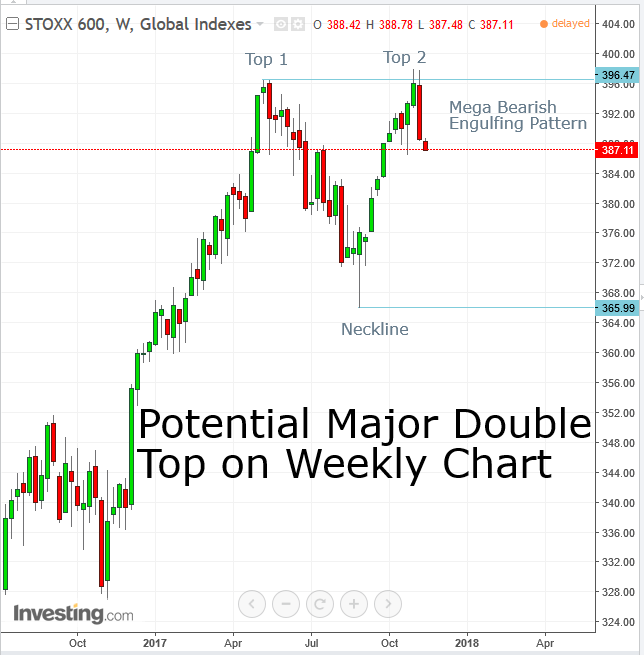
The Stoxx 600 declined, extending last week’s drop which wiped out nearly a month's worth of gains.
The UK's FTSE 100 bucked the trend thus far this morning, boosted by the pound’s weakness. As previously discussed numerous times, local FX weakness renders domestic exports more competitive to importers and local stocks cheaper for international investors.
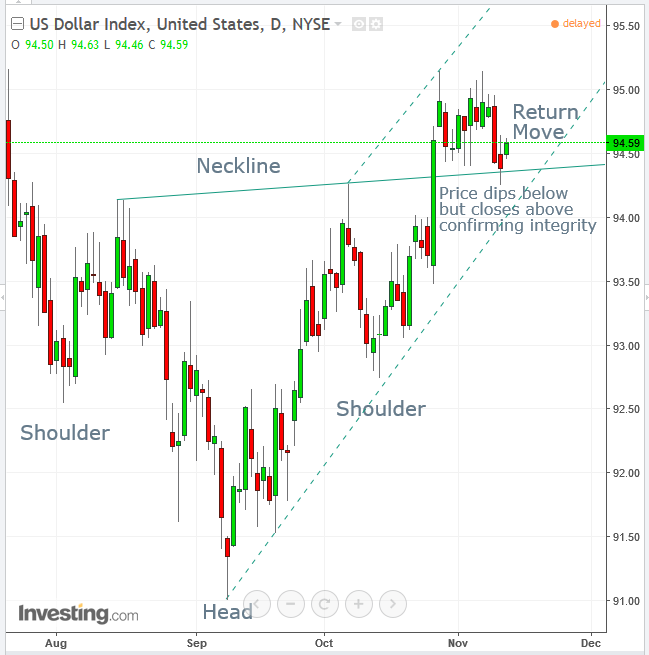
The dollar advanced, after completing a bottom and a return move, successfully testing the pattern's integrity.
The currency peer that lost the most versus the USD and other majors this morning was sterling, as Theresa May's ongoing, unsuccessful Brexit negotiation with the EU has gotten further away from a resolution, both due to a series of political scandals that have distracted her administration, as well as a harder EU line.
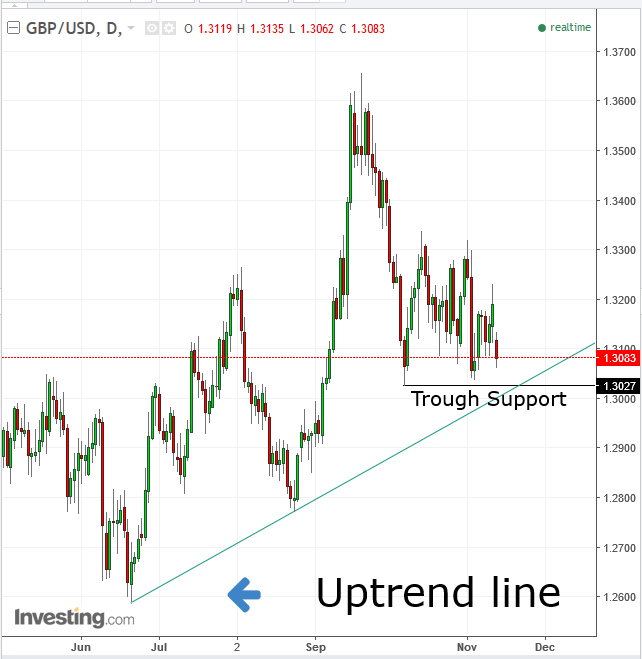
Since May’s platform was predicated on Brexit being in the best interest of the UK, this current stalemate is squarely on her shoulders. Forty Conservative MPs are prepared to sign a letter of no-confidence regarding her leadership. An additional eight would be required to initiate a formal challenge.
The news kick starts a week that also features a slew of Bank of England member speeches, along with updates on U.K. inflation, the labor market and retail sales.
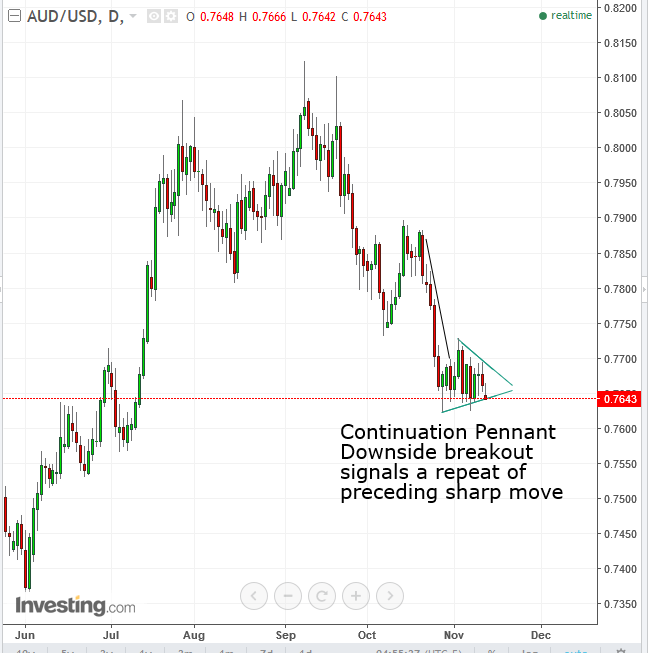
Another currency suffering from political turmoil is the Aussie dollar. John Alexander became the second Australian parliament member in the lower house to resign, after acknowledging he may have inherited British citizenship from his father. Australia’s parliament has been bogged down by a legal quagmire after two senators discovered they held dual citizenship, which the country's constitution prohibits.The most recent resignation weakens Prime Minister Malcolm Turnbull's coalition government.
All this political drama down under comes at a time when the country is dealing with a housing bubble and thus record housing debt, alongside a consistent lack of economic growth. Like any other country, Australia must have political stability in order to deal with its multiple economic challenges. This comes on the heels of the RBA, the central bank, signaling no interest rate hikes in sight. In sum, there's strong downside risk for the AUD and other Australian assets.
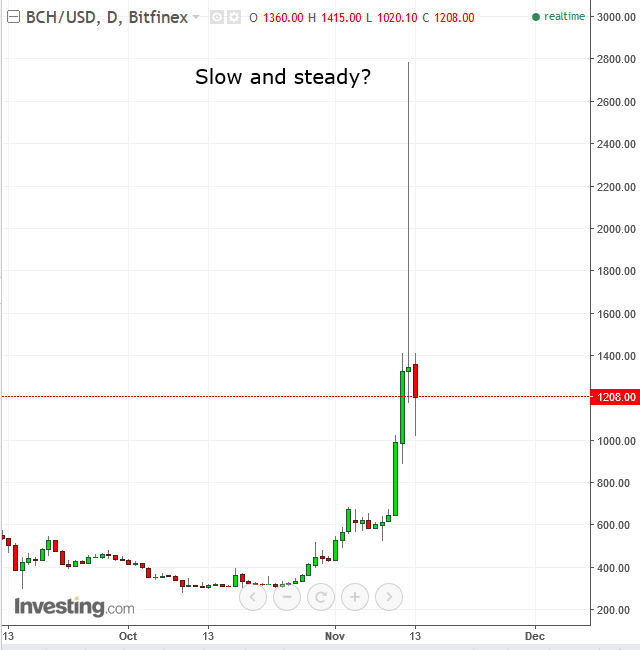
Bitcoin lost some of its luster over the weekend, tumbling 11 percent, extending a decline from last week’s record high to about 26 percent after the cancellation of a technology upgrade. However, it rebounded this morning. As Bitcoin tumbled, its offshoot currency, Bitcoin Cash surged, hitting a record high yesterday of $2,790. This morning, its rally ran out of steam.
After last week's relatively uneventful goings on, the week ahead provides traders a target-rich environment: resumption of US tax reform negotiations in both houses, whose bills will ultimately need to be aligned, particularly with regard to the start date; 2018 for the House's legislation, 2019 for the Senate’s bill. The bumpy road ahead for the plan is sapping market exuberance, as indices begin retracing the journey from this month’s record highs, hit last week.
US inflation and GDP are on the docket. How the Fed interprets the data will have ramifications for next month's interest rate decision and beyond. Weakening inflation would support US Treasuries while undermining the Fed’s justification to raise rates.
Up Ahead
- President Donald Trump is in the Philippines today, the final leg of his Asia tour.
- A raft of closely-watched economic reports from China will be released tomorrow in Asia (this evening US), including industrial production, fixed-asset investment and retail sales.
- Japan’s third-quarter GDP release is slated for Wednesday.
- India's October CPI is due out on Monday.
- Australia updates on employment later this week.
- Outgoing Fed chair Janet Yellen takes part in a European Central Bank event on Tuesday in Frankfurt along with peers from Europe, Japan and the U.K. Chicago Fed boss Charles Evans will also be at the conference.
- U.S. CPI is due out Wednesday. If it misses, odds of a December Fed hike could head toward 50 percent, according to Morgan Stanley.
Market Moves
Stocks
- Japan’s TOPIX fell 0.9 at the end of trade in Tokyo. The Nikkei slid 1.3 percent, the most since May.
- South Korea’s KOSPI lost 0.4 percent.
- Australia’s S&P/ASX 200 Index fell 0.1 percent.
- The Hang Seng Index in Hong Kong climbed 0.2 percent. Country Garden Holdings (HK:2007) jumped as much as 11 percent and Sunny Optical Technology Group (HK:2382) climbed as much as 5 percent after their inclusion on the index. Razer Inc (HK:1337) was up 24 percent above its IPO price, less than a week after the initial public offering of China Literature Ltd (HK:0772) skyrocketed on its debut on the city’s bourse.
- S&P 500 Futures were little changed. The S&P 500 fell 0.2 percent last week, when the VIX surged 24 percent.
- The MSCI Asia Pacific lost 0.5 percent.
Currencies
- The Dollar Index gained 0.18 percent, retracing a 0.25 percent gain.
- The British pound retreated 0.5 percent to $1.3133.
- The yen added less than 0.1 percent to 113.46 per dollar.
- The Aussie was little changed at 76.61 U.S. cents.
- The euro bought $1.1657.
Bonds
- The yield on 10-year Treasuries was at 2.38 percent, down more than 1 basis point after climbing 6 basis points on Friday.
- Australia’s 10-year yield increased one basis point Monday, to 2.62 percent.
Commodities
- West Texas Intermediate crude was little changed at $56.80 a barrel.
- Gold was at $1,277.43 an ounce.
